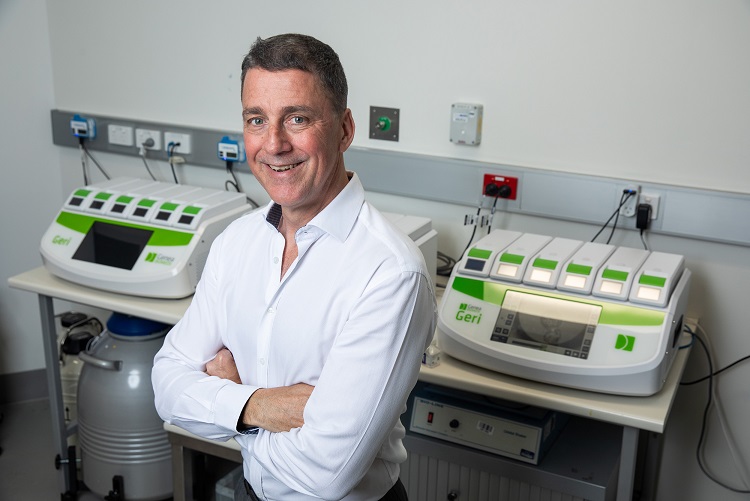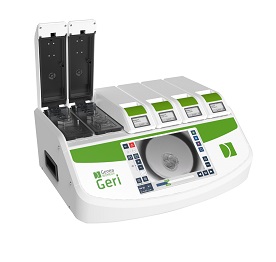World-leading IVF scientist Steven McArthur combines science and innovation to improve outcomes for IVF patients at fertility clinic, Genea
Growing up surfing the waves of Merewether Beach, Steven was drawn to science from a young age. After taking an interest in biology at high school, Steven went on to study science at the University of Newcastle and was soon offered a job as a technical officer in an IVF laboratory.
“In my second year at the University of Newcastle I was very fortunate to get a job at Lingard Fertility Centre in Merewether, which was really convenient because I had the surf 200 metres from my house on one side, and then my job 200 metres on the other.”
After graduating with a Bachelor of Science in 1993, Steven began working at Sydney IVF which was reborn as Genea in 2011.
“My interest really grew from there because it was such a new area of clinical science. IVF had been underway for about five or six years as a clinically offered service, but it was pretty much brand new in Australia,” he said.
Throughout the 1990s, Steven was part of a team that was instrumental in doubling the success rates of IVF procedures.
“The science back then and the abilities that we had in the labs were vastly different from what we have now, and that was reflected in the success rates. Clinical pregnancy rates back in 1989 and through the early 90s were less than 10 percent in a standard IVF procedure.
“Fast forward to today and overall pregnancy rates from IVF procedures are now around 50 percent. The tools and techniques we have developed are light years ahead of where they were in the early 90s.”
In addition to developing innovative scientific techniques used in IVF procedures, technological advances that allow patients to become more intimately involved in the process have improved the overall IVF experience for couples.
“As a reality, about one in six couples will face infertility and it’s a massive impact on the normal flow of life. The nature of someone going in and performing a procedure where they extract eggs from your stimulated ovaries creates a lot of anxiety and fear.
“One of the key drivers for developing the Geri incubator was to bring patients into the process more.”

Steven played a significant role in creating the Geri incubation system, designed to mimic the undisturbed natural environment of a woman’s body. In addition to increasing the number of high-grade embryos per cycle, the built-in time-lapse camera allows patients to be closer to their embryos than ever.
“We developed the Grow by Genea app, which is a mobile application that allows patients to actually see their embryos developing inside our incubators. That sort of access and ability to be closer to the treatment for our patients is great.”
Although Steven is no stranger to finding solutions to unique problems, 2020 has brought with it a new wave of challenges. Steve and his team have been looking at new ways to adapt and use technology to keep staff safe during the pandemic.
“One of the areas we are focusing on now is machine learning or artificial intelligence. One of the key things we are focused on is how we keep staff safe
“In an IVF sense, artificial intelligence can help us choose the best embryo for transfer. It doesn’t take the scientist out of it, but what it will mean for us is that we might be able to have fewer scientists in the lab at any one time.
“Using AI technology, the scientist can choose an embryo they think is best for transfer and run an image we have collected from the Geri incubator to get some validation from the AI. The beauty of AI or machine learning is exactly that: it learns. So over time, the machine will get better and better at confirming which is the best embryo for transfer.”
By using AI to help identify the highest quality embryos, Steven hopes to help couples achieve their dream of starting a family sooner with less stress and heartache.
“What we know is that currently 50 percent of the time an embryo will implant and make a live birth, and 50 percent of the time it won’t. It’s really about picking the best one for that first embryo transfer.”
According to Steven, identifying better embryos means better chances of a successful pregnancy.
“It’s plain and simple: it increases the number of babies.”
Reflecting on his career, Steven says,
“What makes me really proud is all of the babies that have been born from the hard work that we have all put in.”
Steven was recently recognised for his incredible contributions to science at the 2019 University of Newcastle Alumni Awards.
“The Alumni Awards were an excellent opportunity to reconnect and if I can help the University by promoting the quality of the education there and the quality of the science education, in particular, I’d be happy to do so.”
Since reconnecting with the alumni community last year, Steven has been working with the University to explore new learning opportunities for students with an interest in reproductive sciences. He believes that working with students to discover new technologies and innovations is the key to finding solutions to problems in the future.
“Bringing outside knowledge and expertise into any organisation is immensely valuable. There will be infertile patients long after myself and my present colleagues are gone so you want to encourage people into your field. Whether it be the technology, the clinical science, or the physiology of people, knowledge in 2020 is so vastly different to when I was at University 30 years ago. To ignore those advances and not to integrate them into your system would be crazy.
“It’s my hope that Genea and the University of Newcastle can work closer together because it gives us opportunities to provide students with a potential pathway and for us to gain new knowledge.”
Related news
The University of Newcastle acknowledges the traditional custodians of the lands within our footprint areas: Awabakal, Darkinjung, Biripai, Worimi, Wonnarua, and Eora Nations. We also pay respect to the wisdom of our Elders past and present.